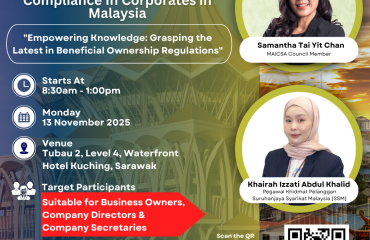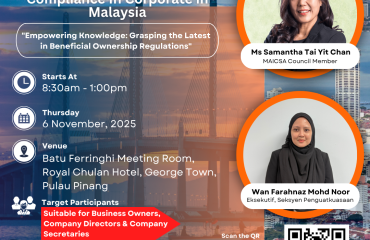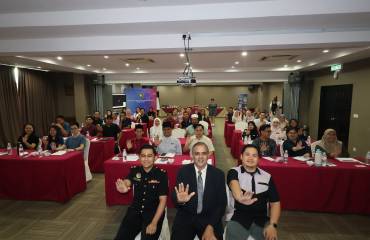
PRESS STATEMENT
Friday, 18 October 2013
Money politics is serious, and we, at Transparency International Malaysia (TI-M), view it as a form of political corruption. No question about it! Money politics is used to describe the buying of votes during party and general elections. It is also referred to as the disbursement of contracts, licences, shares, development funds and other benefits.
Money is distributed out but never done out in the open, but usually in special programmes organised by both the incumbents and the challengers. Abuses of government machinery should also be curtailed. The recent exposure of a ‘secret’ meeting ‘meant only for UMNO members’ by one of the incumbents is a good example, although the meeting was organised as a special meeting on security issues. At the same meeting, four candidates for UMNO’s Supreme Council were also introduced.
In the lead up to the coming UMNO polls, TI-M has received numerous feedbacks that a lot of money is being distributed this year to buy votes. What we understand is that with 146,000 voters in total, there is a lot of cash involved, and distributed at ‘special’ programmes organised for the three Vice-President incumbent, who are holding senior ministerial posts
In the past, Member of Parliament of Gua Musang, Tengku Razaleigh Hamzah had spoken about money politics that is prevalent in UMNO polls. In an interview with TI-M in 2009, Tengku Razaleigh mentioned that he was tasked with identifying sources of funds for the party and reiterates that, “All these accounts were properly audited. I still keep these accounts with me for fear that I may be accused…” Recently, Minister of International Trade and Industry (MITI), Datuk Mustapa Mohamed has also received complaints from UMNO members that money politics is still a big issue. In the past, even former prime minister, Tun Dr Mahathir Mohamad had complained about money politics in UMNO. TI-M wants to know what the Malaysian Anti-Corruption Commission (MACC) is doing about the issue of money politics.
Money politics can no longer be swept under the carpet, as it has many implications such as scandals involving huge sums of money and abuses of government machinery for the individual’s political survival. It also means that there is no level playing field for those who do not have deep pockets. Pressure to become corrupted builds up, leading to some of the big scandals that we have seen in recent years.
Even if UMNO (or any other political organisation) considers it as an internal party issue, MACC should ask whether the source of the money being distributed commensurate with the financial standing of the individual candidates, and if it is money donated to the party or division, whether it is being paid in return for a business favour. MACC Chief, Tan Sri Abu Kassim, once quoted, “Political corruption is the mother of all corruption. The MACC Act 2009 is clear about the offence of using public office for any form of gratification.” Now is the time to walk the talk and UMNO’s president should have a say in the way money donated to an individual division is being used, especially if it is for buying votes.
If the issue of corruption is not being nipped at the bud, it will eventually lead to bigger corruption cases. The candidates who take on the senior posts within UMNO will eventually be given ministerial portfolios, where they are involved in making major decisions regarding mega projects. The question is: Are some of these mega projects viable, or are they just payback to those who help funded the ‘cash-for-votes’ campaigns? In addition, “money politics” is regularly used in reference to the phenomenon of “political business” which is a concept used to describe the links between politics and business, especially party ownership of corporate entities, the direct and indirect control interference of political parties and politicians in the corporate sector.
A recent good example is the controversial bridge across the Straits of Malacca. A number of Malaysians, including economists, are questioning the economic feasibility and the potential disruption to commercial activities on the trade-heavy sea straits when the 48.69km Malacca-Dumai bridge is built, spanning the world’s busiest shipping lane.
Questions have also been asked why this announcement was made at a time when former Malacca chief minister, Datuk Seri Mohd Ali Rustam is vying for Vice Presidency post, even though the 71.2km-long transnational expressway between Dumai and Pulau Rapat had not cropped up in any Economic Planning Unit meeting. In 2009, Mohd Ali was disqualified when he was vying for the same post, after being found guilty of money politics.
The project is a mega project involving an estimated cost of US$13-15 billion (RM41 – 48 bil), which is a hefty amount, considering that the country is already in the deficit and it is making every attempt to slash government subsidies for petrol. The project was first mooted in 1995, but later it was scrapped when the country was hit by the Asian financial crisis. In 2006, Ali Rustam revived the project again, and recently, it was being mooted again at a time when the country is going through economic tough times.
TI-M wants to know whether other alternatives have been thought through, which could equally boost the economic growth of the region? Instead of a bridge, has the Malacca State Government look at other alternatives such as starting luxurious cruises across the Straits of Malacca, which would cost very much less to operate, and probably more economic viable for the private sector to operate, in order to help boost the tourism in the Indonesia-Malaysia-Thailand Growth Triangle. Before it gives further thoughts to the Dumai bridge, the state government should ask, “What are the benefits of this huge investment to Malacca over the next 20 years? Is there a huge payback for Malaysia, or would it simply attract more illegal immigrants from Sumatra who would be able to take a coach to get across the expressway?”
TI-M views that such mega projects lacked transparency as much of the details have not been published and debated upon, but the present chief minister, Datuk Seri Idris Haron had announced that the project would proceed. Questions have been raised by analysts on the source of funding if it is not the Federal Government.
The lack of transparency in such mega projects is what worries the Malaysian taxpayers. Recently, the Minister in the PM’s Department, Datuk Paul Low announced that the Cabinet has approved the setting up of team to monitor projects valued at more than RM500 million. Why cap at RM500 million when the roof of RM292 million Sultan Mizan Zainak Abidin Stadium collapsed for the second time?
TI-M, speaking as the Voice of Conscience of the People, wants the MACC to be proactive and start probing into this mega project to ensure that, even if the project were to proceed, every transaction should be done above board and any attempts for bribery should be prevented. Corruption is like cancer; therefore, prevention is better than cure. If the MACC fails to carry out its job, it will fail the next generation of Malaysians who would have to bear the burden of paying off the hefty loans, possibly over the next 100 years. We owe it to them, to leave behind a good legacy and a rich inheritance, not a huge national debt.
TI-M will be organising a Walk Against Corruption in December 2013 to celebrate the International Anti-Corruption Day which was observed annually on 9 December. This is the time for Malaysians from all walks of life to step forward to show their solidarity against corruption, and make their voices heard at Putrajaya. For further details, check http://transparency.org.my/ in two weeks’ time.
END.
Issued by :
Dato’ Akhbar Satar, President Email : akhbar@transparency.org.my
Transparency International Malaysia







